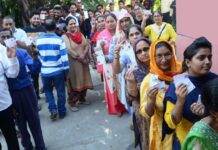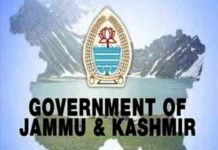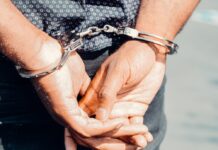by Saima Bhat
SRINAGAR: After remaining suspended for around eighteen months, the government on Friday decided to restore the 4G mobile internet services in the entire J&K, finally. Initially, news being attributed to some media houses, the confirmation came when Principal Secretary PDD and Information, Rohit Kansal, who is also government spokesperson, tweeted, “4G mobile internet services being restored in the entire J&K.” The facility, however, is restricted to postpaid customers, only.

Last year in August, the government had told the apex court that a special committee looking into the issue of internet restoration in J&K was considering allowing 4G internet access on a trial basis in the UT. Later on August 16, the high-speed internet was restored on a trial basis, in the two districts of Ganderbal and Udhampur, which continued till date.
The decision to revoke the ban completely, officials said, was taken by a committee constituted under the orders of the Supreme Court after an objective assessment of the prevailing circumstances and necessity of continuation of (speed) restrictions was done.
The Petition
On January 22, the Private Schools Association of Jammu and Kashmir filed a petition in the Supreme Court seeking restoration of 4G mobile Internet services. “The children of Jammu and Kashmir have already lost two academic sessions because it is impossible to conduct online classes using video-conferencing tools such as Zoom or WebEx at 2G mobile Internet speed,” the petition read.
Schools witnessed closures after August 5, 2019 coupled with closure due to Covid-19 pandemic. “The severe impact of school closures and the inability to shift to remote learning was recognised by the Jammu and Kashmir State Board of School Education, which reduced the syllabus by 40 per cent for annual examinations last year for Class 10, 11 and 12. However, no such concessions are available for students appearing for national level competitive exams,” it read.
The petition claimed that due to the restrictions on high-speed internet, many students have been compelled to leave their families and live outside the erstwhile state to prepare for competitive exams. “Those without such privilege are left to compete with students from the rest of country on an unequal field,” a spokesman of the association said.
According to the association, which represents over 3,800 schools, the denial of access to education has taken a toll on the mental health of children. “We hope the court will restore 4G mobile Internet access to protect the future of our students,” the association spokesman said.
Pertinently, National Conference president and former chief minister Dr Farooq Abdullah had also requested PM Modi during a book release function to restore 4G. “The Prime Minister is saying 5G is coming in India while we are deprived of 4G (mobile internet service). May he come and live here after leaving the chair and see how we are living under 2G (service),” he said.
The Gratitude
Lieutenant Governor Manoj Sinha thanked Prime Minister Narendra Modi and Home Minister Amit Shah, for the restoration of the 4G internet in Jammu and Kashmir. “I thank the PM Narendra Modi and HM Amit Shah for acceding to our request and restoring 4G services in the entire J&K UT. The move will fulfill the aspirations of the people, particularly the youth,” his office said.
Reacting to the development, former chief minister Omar Abdullah said it is “better late than never”. “4G Mubarak! For the first time since Aug 2019 all of J&K will have 4G mobile data. Better late than never,” he tweeted. However, retweeting a tweet from journalist Vijdan Kawoosa, Omar gave the exact number, “551 days of ban-that’s the final count.”
Newly launched Apni Party had 4G restoration as the main issue. While extending gratitude to Prime Minister Narendra Modi for restoring the services, party president termed it as “positive development for students and the youth of J&K.” He also thanked PM Modi for fulfilling this demand of the people of J&K.
The Grievance
Additional spokesperson of the National Conference, Sarah Hayat Shah responded by asking for the “rights.” In her tweet, she wrote, “4G a basic thing. No favour. Restore our Rights.”
Downplaying the restoration as any favour, writer and editor Jairaj Singh, reacted, “4G restored, not dignity.”
Editor Anuradha Bhasin said the restoration is more about farmer’s protest. “Why do I have this uncanny feeling that this 4G restoration is less about J&K people and more about international image due to farmers protest,” she wrote on Twitter.
Another journalist and author Gowhar Geelani said the cellular companies should be taken to the task. “For 18 long months, all cellular companies like @airtelindia, @BSNLCorporate, @reliancejio etc have looted the people of the Kashmir valley, the Chenab valley, the Pir Panchal and plains of Jammu. All of them have taken money from customers for services they haven’t provided,” he wrote on Twitter and added, “Someone should file cases for compensation against these looters.”
Drawing comparisons, Asmita Bakshi, a journalist working with multiple media houses said, “This internet shutdown in J&K was the longest in global history. You know which one it beat to get there? The internet shutdown in J&K in 2016.”
The Ban
The ban on the internet was imposed hours before the abrogation of special status was announced in the parliament on August 5, 2019. This was done to prevent backlash against the decision to revoke the special status and splitting the state into two union territories. The ban became the world’s longest-running internet shutdown in a democratic country. However, later after more than five months, the 2G internet facility on mobile phones was restored.
The administration, extending the ban multiple times in the past, had said that the mobile internet services were throttled to prevent the “spread of misinformation and militants from abusing the networks.”
An internet shutdown tracker run by Delhi-based digital rights organisation Software Freedom Law Centre showed that since 2012, there have been 433 internet shutdowns in India, of which 226 were in Jammu and Kashmir.
Meanwhile, journalist Irfan Hakeem also reached out to his Twitter and tweeted, “For last 550 days in around 140 orders J&K admin claimed that restrictions on #internet/#4G is helping thwart/control everything (infiltration/sedition propaganda/radicalism/anti-India agenda). These J&K admin orders make an interesting case study…”
The Costs
The internet ban had huge costs across all the sectors. From education to entrepreneurship, the ban banged the prospects of revival. As told by people associated with trade and commerce, there has been huge loss to the economy, besides the loss of jobs in different segments.
As figures were given out by Kashmir trade leaders, the ban coupled with the Covid lockdown had incurred a loss of around 40,000 crores in the valley alone and leaving more than five lakh people across sectors jobless.
The hardest-hit sectors were education, tourism, transport and handicrafts. In Covid crisis, health was also at stake.















